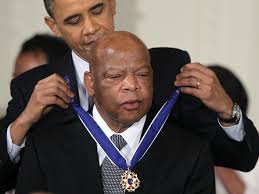
Our closest direct link to Martin Luther King, Jr. – whose life we’ve celebrated this week – was John Lewis. They were colleagues, yes, but more than that. Martin Luther King loved John Lewis like a son. While Dr. King died 52 years ago, Congressman Lewis lived until just this past July. His voice and life brought the importance of King’s work and his commitment to nonviolence well into our 21st century. John Lewis’ legacy encourages us still today.
In his life and work, Lewis reminded us that nonviolence is more than a political tactic; it’s a way of life. It is making the priority of love so central that we will not let our anger overthrow it. Nonviolence is cultivating the authority of love so deeply that we keep our “eye on the prize” – love and justice and kindness – even when we’re challenged by attack.
Henri Nouwen used to tell the story of a wanderer strolling along a road in China who spies an elderly man bending over a tree by the river. He walks over and sees the man reaching into the tangled roots along the water’s edge. The man is trying to rescue a scorpion which has somehow gotten caught in the gnarled roots, but each time he reaches out the scorpion stings him. The old man’s hand is red and swollen, but again he reaches out to the scorpion, and again it strikes him.
“Don’t be foolish, old man,” the wanderer says. “Let it go, and don’t waste your time. It’s not worth the pain.” The kneeling man turns and says, “But it is. Why should I let the scorpion’s nature – which is to sting – change my nature which is to save?”
Nonviolence is that spiritual focus, to keep love central in our very nature and not let others change it. Marchers back then – and all of us today – need training and practice to keep that focus.
Earlier this week I saw a PBS program on John Lewis that showed marchers being trained in keeping their focus on love. A team was preparing for a sit-in. One young man sat in a chair while others cursed him, flicked cigar ashes in his hair, shoved him, spat on him, and poured a drink on his head. He kept his composure. In real life, of course, they endured worse violence than that. But they were preparing for their battles.
Then I think of my battles – not in the street but just at home – on Facebook, or with my wife. I hear a barbed word. I read a provocative post. Or I’m slighted at the grocery store. My inner anger kicks in, I start fuming, and my brain begins ranting. Or I spit out a nasty response, or post a snide put-down. And sooner or later, I realize … I’ve lost. I’ve let love lose and anger take over.
We’ve all seen the power of undisciplined anger. It’s as public as a mob, whether it be at a Selma bridge or a Charlottesville statue or the US Capitol. And it’s as ordinary as talking ugly to your family, firing off an offensive email, or “getting even” whenever our feelings are hurt. We are immersed in a world of selfishness and violence, a world John Lewis said, “I had to learn to be maladjusted to.”
Don’t we all.
Lewis summarized his life principles this way: “Never let anyone — any person or any force —diminish your light. Release the need to hate, to harbor division… [Release] the enticement of revenge. Hold only love, only peace in your heart, knowing that the battle of good to overcome evil is already won.”
You and I are probably not marching in the streets. We may just need to practice keeping our cool in the grocery line. We can find our own ways to “Be a headlight,” as Lewis said, “not a taillight.” To lead with integrity. To keep our eyes on the prize. To release hate and hold only love.
And through a multitude of ordinary and extraordinary challenges, we can resolve not to let nobody turn us ‘round, turn us ‘round, turn us ’round. No, we don’t let nobody turn us ‘round. We’re gonna keep on walkin’, keep on talkin’, marchin’ up to freedom land!
For more information on leadership, see 30 Days with King David: On Leadership.
